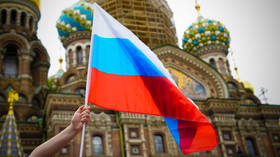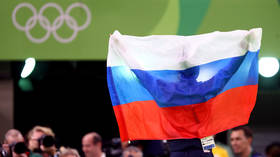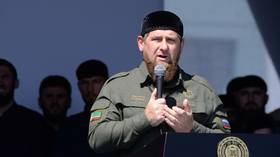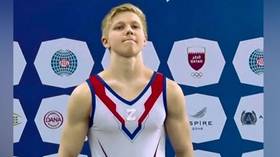Bans protect Russian athletes, IOC chief insists
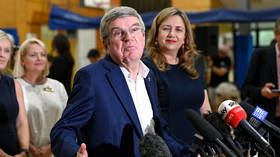
International Olympic Committee (IOC) president Thomas Bach has claimed sanctions were imposed on Russian sport partly for the good of its athletes, while cautioning any Russian stars against supporting their country’s military campaign in Ukraine.
Speaking at an IOC session in Switzerland on Friday, Bach repeated the refrain that the IOC had been forced to recommend a ban on Russian and Belarusian athletes from all international competitions because Moscow “blatantly violated the Olympic Truce.”
In sidelining Russian and Belarusian sport, Bach claimed the reasoning had been “twofold” – including for the safety of athletes from the two nations.
“Our actions are twofold: sanctions on the one hand and protective measures on the other...,” said Bach.
“We had to take protective measures to ensure the integrity of international competitions. For this, we had to recommend not to allow Russian and Belarusian athletes and officials to take part in competitions, or at least to prohibit any identification of their nationality.
“Let me emphasize that these are protective measures, not sanctions, measures to protect the integrity of competitions.
“The safety of Russian and Belarusian athletes and officials could not be guaranteed because of the deep anti-Russian and anti-Belarusian feelings in so many countries,” added the German.
Bach claimed that the IOC had effectively headed off inevitable efforts from some governments to take matters into their own hands – which would mean a complete “politicization” of sport.
“Because of this dilemma, we had to take these protective measures, albeit with a very heavy heart,” said the 68-year-old.
Describing relations with the Russian political leadership as “dramatically deteriorating in the past years,” the Olympic boss attempted to justify why Russian athletes had been pressed into international isolation, while past conflicts had not led to similar measures.
“We received questions from two angles,” said Bach.
“The first question was: why did we react to this war in a different way than to the many other wars around the world?
“There are two answers to this. The first is, the war in Ukraine is different because it is a blatant violation of the Olympic Truce.
“The second is, the far-reaching political, social and economic consequences of the war make it a turning point in world history.
“The second question was: Why are our sanctions limited to the government and national symbols, and not extended to all members of the Russian Olympic community?
“The answer is, according to international rule of law, sanctions can and should only be imposed on those who are responsible for something.
“This war has not been started by the Russian people, the Russian athletes, the Russian Olympic Committee or the IOC members in Russia.
“Imagine where the precedent of such a breach of the rule of law by us would lead to.
“Every individual, every athlete, every sports official, every sports organization would have to be punished for any illegitimate political action of their governments.
“There is no justice if you paint everyone with the same brush. This would even be counterproductive because it would play into the propaganda of those who are claiming that sanctions are just a part of a wider conspiracy directed against their country,” added Bach.
Some Russian athletes such as double Olympic champion swimmer Evgeny Rylov and gymnast Ivan Kuliak have faced personal sanctions for supposedly making public gestures in support of the conflict in Ukraine.
Rylov was banned for nine months by governing body FINA after attending a Moscow concert in March to mark the reunification of Russia and Crimea, appearing on stage with a ‘Z’ symbol on his jacket, which has been used by Russian troops in Ukraine.
Gymnastic Kuliak was hit with a one-year ban by governing body FIG this week after he attached a ‘Z’ to his leotard at an event in Doha, although the Russian and his coaching team have said they faced repeated provocations from Ukrainian rivals.
Bach issued a thinly-veiled warning against any Russian athletes thinking of expressing support for their country’s leadership.
“We are monitoring closely who is supporting this war with their statements or actions and have drawn and will draw the necessary consequences,” said Bach.
“This has been demonstrated for example by FINA and FIG, who have sanctioned athletes that have expressed such support for the war.”
The IOC chief added, however, that anyone not speaking out against the Russian government should not be judged because “we also have to realize that in Russia there is a law in place threatening anyone who speaks out against the war with up to 15 years in prison.”
“Therefore, we can appreciate that, under such circumstances, silence in itself can be a message,” claimed the IOC chief.
The IOC’s stance has been widely challenged by Russian sporting and political figures, who have argued it is blatantly discriminatory and undermines Olympic principles.
Releasing a statement back in March, the Russian Union of Athletes went as far as to describe the situation as a “sports genocide” against their country.
